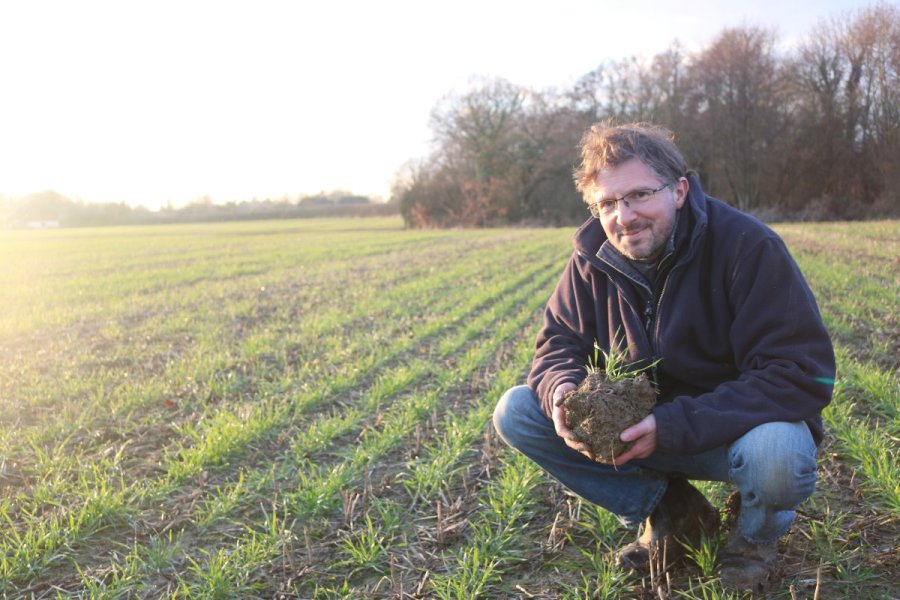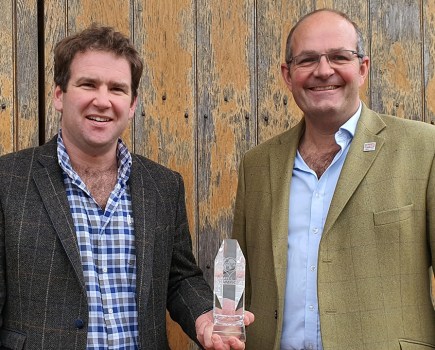Guy and Claire Eckley have won awards for their climate-positive nutrient-dense Pure Kent produce. CPM visits to discover how food produced from regenerative agriculture can provide the route to net zero.
Producing quality food through regenerative agriculture is a far more sensible route than growing trees.
By Tom Allen-Stevens
“This is our cultivations team,” says Guy Eckley as he sifts through the worms that fall away from the heavy clay soil he’s just dug up. The field of volunteer oats has recently had its green cover rolled in the frost ready for spring cropping.
“These guys won’t burn a lot of diesel and they’re already at work in January, way before we’d be able to get anything other than a set of rolls on this land.” It was the need to stretch labour and machinery over a greater cropped area that prompted Guy and Claire Eckley down the regenerative agriculture route 11 years ago.
But these days it’s more about getting the biology to do the work, Guy explains. “If you have a healthy soil, you have a healthy plant that looks after itself. The soil biology cycles the nutrients the plant needs, so you apply fewer inputs and the crop is less prone to disease and pests. It also means you produce nutrient-dense, healthy food.”
And it’s this that Guy and Claire have encapsulated in a brand. Pure Kent cold-pressed rapeseed oil and stone-ground flour, processed on the farm, earned them Kent Grower of the Year in the 2021 Taste of Kent Awards. What’s more, this is achieved with an impressively small carbon footprint – an analysis of their wheat crop last year revealed they’re actually sequestering carbon (see panel on pxx).
“We’ve shown you can grow good, nutritious food and get to net zero. If we’re looking as an industry to sequester carbon, clearly producing quality food through regenerative agriculture is a far more sensible route than growing trees,” says Guy.
Eckley Farms grows a total of around 500ha at four locations around Maidstone in Kent, with a further 70ha in stewardship. Soils vary from Greensand to the heavy clay at Saynden Farm near Staplehurst where the business is based, while there’s some more alluvial soil near the river at Marden.
“Most ground has converted well to regenerative agriculture and regularly pushes out wheat yields in excess of 10t/ha. Some of our heaviest clay is still very tight and seems to struggle to get the biology to do its thing, with yields averaging 8.5t/ha,” he reports.
The cultivation policy changed through necessity as the business expanded ten years ago. “We’re direct drilling, following a controlled-traffic system over most of the land, but do find we still have to pull something through our heavier soils that need a bit of shatter,” explains Guy.
“We purchased a John Deere 750A drill to work alongside the 4m Horsch Sprinter. The combine is a JD s685 with a 9m header, so the CTF system we follow is based on 8.8m – the tramline width is 26.4m and we adapted the 750A from 6m to 4.4m, adding an extra coulter to the Horsch to match.
“Blackgrass has been a big issue for us, but we’ve widened the rotation and get away with drilling slightly later to keep it in check. That’s meant we need a little more disturbance to get the crop underway in autumn, so we’ve now sold the 750A and just use the Horsch, fitted with narrow Metcalf points on its tines.”
Drawn towards regenerative agriculture, it was the rotation that came under scrutiny early on. Previously, two wheats were followed by oilseed rape or beans. The second wheat was dropped, with spring oats brought into the rotation. “You have to earn the right to follow regenerative agriculture,” says Guy.
“We realised the intensity of the second wheat was putting pressure on the system. The added break crop means we don’t have to add such a heavy chemical cocktail, which takes the pressure off and the crop you want to grow does better.”
While he’s eased back on the inputs, the crop receives plenty of organic manure. Guy pulls up in front of the compost heap that’s been recently turned over. Chicken and horse muck have been mixed in with other farm residues and he picks through the surface to reveal the fungi getting to work within.
“You have to strike a balance with additions. They’re great at building soil carbon, but can lock up nitrogen – in the past we’ve got it wrong, using a lot of paper waste, and had to apply additional N. But now we’re growing 13% milling wheat with just 180kgN/ha.”
Cover crops form another key ingredient of the regenerative agriculture system. “We started growing many species, aiming to select just a few, but actually narrowing down the mix is just what you don’t want to do.”
Guy’s part of a local group that calls itself the Kent Nutters – eight like-minded farmers with a self-confessed obsession for picking the perfect mix, type and even size of cover crop seed. “One tip we’ve picked up from (2020 Climate Change Champion) David Miller in Hampshire is to pick varieties with smaller-sized seed – it cuts the cost for the same plant population.
“You don’t want it too thick anyway, as you then have to use more glyphosate and the cover can shadow blackgrass. We tend to graze ours with sheep, which takes out the biomass and turns it into soil biology,” he explains.
The exchange of ideas with the Kent Nutters feeds a thirst for knowledge Guy has for the system he’s nurturing. Back at the farmhouse, he gestures to a pile of books on the kitchen table. “There are some, like Nicole Masters’ For the Love of Soil that explain the ‘how’, while others, like David Montgomery’s Dirt, illustrate ‘why’ we should be doing it. They encourage you to think differently, not follow the rules, and look to the edges for a different direction.”
At that point the phone rings and Mike Harrington of Edaphos joins the conversation. He works with a number of farmers in the area, including Guy, who he says have developed their thinking of an arable system outside the conventional ‘norm’. “The key is to use your head,” he says.
“The industry has worked towards taking away a farmer’s ability to think through any problems, and tried instead to address them with products. But Guy’s one of a growing number of farmers who believe this way of intensive agriculture has put a huge reliance on these inputs and it’s a system that’s not working – we’ve burnt off the carbon in our soil and not recognised its value in nurturing the crops we grow.”
Mike encourages an approach that builds soil carbon and soil health, arguing that a healthy soil goes a long way towards giving a crop the protection it requires. “There are no simple answers. You work towards Nature’s approach – put the living system first.”
It’s this approach that Guy believes taps into the soil reserves and opens up pathways in plants to reach, access and assimilate nutrients and thereby give the crop its own strength and resilience. “We haven’t applied any bagged phosphate or potash for many years and use considerably less fungicide.
“Synthetic inputs can inhibit a plant’s ability to transfer sugars down to the roots to unlock the nutrients it requires. Rather than apply a nutrient that may be lacking, you give the crop a catalyst that stimulates it to find and process what it needs.”
This rich resilience then feeds through to the crop produce itself, he says. Back out in the yard, Guy reveals the home-made processing plant he’s developed, first for the oil, and then for the wheat. For both, the emphasis is on a crush, or stone-ground process, that preserves the nutrient density he believes is locked in and gives that Pure Kent product its distinctive characteristics.
“We have been bottling over 100,000 litres of oil per year and demand for the flour from local craft and home bakers just went crazy during lockdown. Our main buyer for the oil is now looking to buy the carbon we’ve captured, while the rapemeal makes a very attractive low-carbon cattle feed.”
Local customers can buy online and then come to the farm to collect their purchases, and Guy believes it’s a market with greater potential. “Local bakers can’t get enough of the flour, but 90% of what we produce is sold as if it’s standard, conventional wheat. It’s climate-positive, nutrient-dense wheat, grown from healthy soils producing healthy plants. That’s food for healthy people that’s not costing the earth.”
What makes Guy Eckley a Climate Change Champion?
Innovative ideas
Guy and Claire have not only followed a farming system that is sequestering carbon, they’ve developed an award-winning brand for the food produced from it, proving that the production of healthy food goes hand-in-hand with the drive to net zero.
Productivity push
A focus on getting the soil and plant biology to do the work has led to a substantial reduction in inputs, particularly fertiliser, for little or no drop in yield – a 10t/ha full-spec milling wheat is achieved with 180kgN/ha, for example.
Cultivation care
The Controlled Traffic Farming system, combined with direct drilling, keeps soil disturbance to a minimum. Worms are the main cultivation providers.
Bio-based boldness
Pure Kent customers have the opportunity to offset their own emissions through investing in the farm and its produce.
Set your baseline for the carbon journey
With fertiliser prices tripling over the past few months, and few signs that these rises will ease back, there’s seldom been a better time to look closely at how you manage your resources, says Kate Bannister, project delivery manager for NFU’s Net Zero campaign.
“If there’s one thing to focus on, it’s nutrient-use efficiency. For most growers, nitrogen fertiliser represents your biggest source of emissions and recent price rises will be hitting the bottom line. So anything you can do to utilise it better on farm will be a win-win.”
The NFU is encouraging all growers to take stock of their greenhouse gas emissions. “The carbon calculators currently available may not be perfect, but all of the main ones give you a good starting point. Using them as a decision support tool can help you put a plan in place.”
While lowering on-farm emissions in the first instance is key to working towards reducing arable’s footprint and input costs, the NFU Combinable Crops board is also highlighting the importance of access to alternative markets and new opportunities. The aim is to help farmers diversify businesses, widen crop rotations and support decarbonising the wider economy.
One example is its work with a range of stakeholders, including Drax, to explore a number of opportunities to source these domestically. Five members of the board are also taking part in YEN Zero, the newest YEN network piloted for the first time this year by ADAS. This focuses on benchmarking and analysing crop carbon footprints of the main arable crops. And NFU, AHDB and CHAP have co-funded a review of the greenhouse gas footprint of the UK cropping sector, due to be released later this year.
“One step growers can take now is to make a commitment through our #Pledge2040 campaign,” adds Kate. “Over 300 NFU members have revealed how they are taking steps on productivity, carbon storage, renewables and the bioeconomy towards making the sector net zero by 2040. We’ve seen some great commitments come through and you may be surprised by just how much farmers are already doing. So the more who get involved, the greater the benefit will be for the entire sector.”
For more on the NFU’s Net Zero campaign, visit www.nfuonline.com/hot-topics/net-zero/
Deadline extended for Climate Change Champions 2022
If you’re doing your bit to champion the cause of the arable sector on its path to net zero, we’d like you to step forward.
CPM has teamed up with leading agricultural suppliers who have a credible Net Zero aspiration to identify individual growers, thought leaders who have already started on this journey. We want to bring them into the top-level discussion about how farming can position itself as the solution to climate change.
UK Farming has set itself the challenging target of Net Zero emissions by 2040. Although led by the NFU, it will take the entire industry, working together in a partnership approach to meet this ambitious goal.
But it will be the growers with the ideas, the progressive outlook and the determination to shape positive change who will make it happen. If that’s you, please apply to be one of our 2022 Climate change Champions today. The closing date is 31 March 2022.




